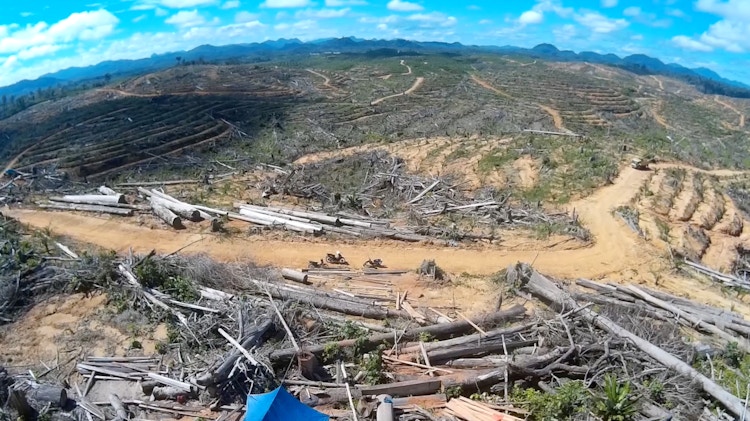Politically important palm oil producer pledges no deforestation
Astra Agro Lestari, Indonesia’s second largest palm oil grower, has announced a strong policy to protect forests, local communities, and prohibit burning throughout its supply chain.

Rainforest destruction on Astra's PT Adau Agro Kalbar plantation in West Kalimantan, Indonesia, April 2015.
2015-09-21
AAL is a politically important industry player, and has the potential to set the stage for a massive government effort to tackle deforestation.
“Astra’s policy represents a huge breakthrough. Even the Indonesian palm oil industry leaders who were previously most skeptical of conservation are calling on the government to launch a major push for forests and community rights,” said Azmi Sirajuddin of Yayasan Merah Putih, a community organization in Sulawesi that has been working with other Indonesian organizations to improve Astra’s practices. “At this point, the government really should have no excuse for inaction.”
Astra plays important role in the Indonesian palm oil industry
One reason Astra has the potential to be so influential is because of its important leadership role in the palm oil industry, and in Indonesian business at large. Astra director Joko Supriyono serves as Chair of GAPKI, the Indonesian palm oil producers’ association, and parent company Astra International is Indonesia’s largest publicly traded company.
Astra will have plenty of company as it pushes for government to do its part to protect forests: Wilmar International, Golden Agri-Resources (GAR), Musim Mas, Cargill, First Resources, Bunge, Cargill, and others have all adopted No Deforestation policies, and many are working with the backing of the Indonesian Chamber of Commerce (Kadin) to push for reforms.
The direct impact of Astra’s announcement will also be substantial: the company has 298,000 hectares of fully developed plantations, and substantial undeveloped forests and peatlands as well – much of it on endangered elephant and orangutan habitat. In May, Astra announced a moratorium on all new development in response to concerns raised by environmental and community groups. Astra is part of the Jardines Matheson conglomerate, which also owns properties including Mandarin Oriental hotels and Pizza Hut chains, both of which had come under fire for their connection to Astra.
“We are very encouraged by Astra’s turn-around. We now expect the company to fully implement its ambitious policy on the ground to protect forests and peat, and ensure respect for forest-dependent communities’ human rights,” said Anja Lillegraven of Rainforest Foundation Norway. RFN has worked with both Nordic investors and local communities to encourage Astra to cease deforestation, and also commissioned a major investigation into Astra’s practices by the consultancy AidEnvironment.
“Our members will be watching Astra and Jardines carefully, but the company’s actions so far give us hope that they’re heading in the right direction,” said Hanna Thomas of SumOfUs.org, which held events this spring outside Mandarin Oriental hotels to call on Astra not to threaten Sumatran elephant habitat.
NGOs excited with development in the industry
One of the major issues that Astra will have to deal with is indigenous communities displaced by previous plantation establishment.
“Our report about Astra highlighted the plight of the Orang Rimba, an indigenous community in Sumatra whose forest was cleared for a 75 square mile palm oil plantation,” said Diki Kurniawan, Executive Director KKI WARSI. “Astra needs to compensate the Orang Rimba and provide them the opportunity to maintain their culture and live with dignity.”
“We commend Astra for putting forward a serious policy to end deforestation and community exploitation in its palm oil plantations,” said Ben Cushing, spokesperson for the Forest Heroes Campaign. “Today was made possible thanks to a broad coalition of engaged advocacy. In light of this action, Forest Heroes is discontinuing the She’s Not a Fan campaign, effective immediately.”
“Given where things were in the palm oil industry just a few years ago, it’s really exciting to see the key Indonesian palm oil producers join the race to forest conservation,” said Glenn Hurowitz, Senior Fellow at the Center for International Policy, who worked with the other groups to negotiate with Jardines and Astra. “I hope Astra and other companies will soon announce strong action to restore forests and other landscapes.”